

Academic Affairs. Planning, monitoring, and evaluating are important elements of metacognition. In “Promoting Student Metacognition,” Tanner (2012) offers the following specific activities that can be incorporated into courses: Brief Intro to Metacognition. The Learning to Learn Series. To interleave while studying, students should choose several topics and spread them throughout their study sessions. The topics can be from the same or different subjects, but some experts believe that this strategy is most beneficial when the subjects are related in some way.
For example, during a study session, a student could devote some time to math, some time to chemistry, some time to biology and then cycle back through the topics, possibly studying the topics in a different order and using different study strategies. The Interleaving Effect: Mixing It Up Boosts Learning. Dual Coding. Concrete Examples. Interleaved Learning (Brain Hack) Spaced Practice.
Test-enhanced learning: Using retrieval practice to help students learn. In essence, test-enhanced learning is the idea that the process of remembering concepts or facts—retrieving them from memory—increases long-term retention of those concepts or facts.
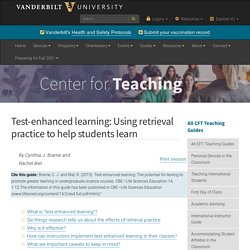
This idea, also known as the testing effect, rests on myriad studies examining the ability of various types of “tests”—prompts to promote retrieval—to promote learning when compared to studying. It is one of the most consistent findings in cognitive psychology (Roediger and Butler 2011; Roediger and Pyc 2012). In some ways, the terms “test-enhanced learning” and the “testing effect” are misnomers, in that the use of the word “tests” calls up notions of high-stakes summative assessments. In fact, most or all studies elucidating the testing effect examine the impact of low-stakes retrieval practice on a delayed summative assessment.
The “testing” that actually enhances learning is the low-stakes retrieval practice that accompanies study in these experiments. 3. What is cognitive load? Battling the Bandwidth of your Brain. Why some people think cognitive load theory might be the most important thing a teacher can understand.

Recently, there has been a surge of interest in cognitive load theory, perhaps aided by comments made by Dylan Wiliam on Twitter that it is ‘the single most important thing for teachers to know’ (Wiliam, 2017). So, what is cognitive load theory, how did it arise and what are the implications for teachers in the classroom? The origins of cognitive load theory can be traced back to the results of an experiment published by John Sweller and his colleagues in the early 1980s (Sweller, 2016).
In this experiment, students were asked to transform a given number into a goal number by using a sequence of two possible moves; they could multiply by 3 or subtract 29. Unknown to the students, the problems had been designed so that they could all be solved by simply alternating the two moves e.g. ×3, –29 or ×3, –29, ×3, –29.
Science of learning. 6 reasons to reject ClassDojo. “I like it because you get rewarded for your good behavior — like a dog does when it gets a treat.”
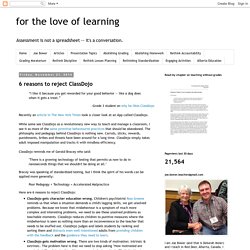
Recently an article in The New York Times took a closer look at an App called ClassDojo. Privacy Concerns for ClassDojo and Other Tracking Apps for Schoolchildren. The OECD’s seven principles of learning. There is a book on my shelf titled ‘The Nature of Learning’ edited by Dumont, Istance and Benavides for the Organisation for Economic Co-operation and Development (OECD).
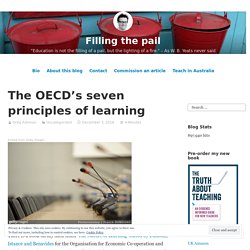
I sometimes dip into it because it contains a chapter by Dylan Wiliam on formative assessment that is a good summary of the arguments that he makes at length in his own books. There are also some chapters that I am less impressed with. Principles. The New Zealand Curriculum principles embody beliefs about what is important in school curriculum - nationally and locally.
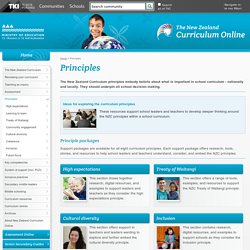
They should underpin all school decision making. Support packages are available for all eight curriculum principles. Each support package offers research, tools, stories, and resources to help school leaders and teachers understand, consider, and embed the NZC principles. This section draws together research, digital resources, and examples to support leaders and teachers as they consider the high expectations principle.
This section offers a range of tools, examples, and resources to support the NZC Treaty of Waitangi principle. Literacy Job Profiles. Adult Literacy, Numeracy and Cultural Capability » Ako Aotearoa. Homepage - Te Kete Ipurangi (TKI) CTI - Teaching Small Discussion Sections. Discussion sections offer students the opportunity to process knowledge on a deeper level, to hear and articulate a variety of viewpoints and perspectives, to develop their position related to a topic and learn to evaluate their own and others’ positions.
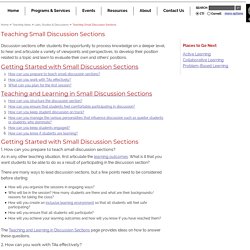
Getting Started with Small Discussion Sections Teaching and Learning in Small Discussion Sections Getting Started with Small Discussion Sections 1. How can you prepare to teach small discussion sections? CTI - Discussions. Literacy Job Profiles. National Centre of Literacy and Numeracy for Adults. The meaning of pedagogy. Incorporating Depth and Complexity Icons Into Gifted Lessons. A convenient untruth.
Preparing learners for instruction. Teaching Adult Undergraduate Students. Adult learners returning to college after military service, parenthood, or other life experiences may approach college in a very different way than their less experienced classmates.
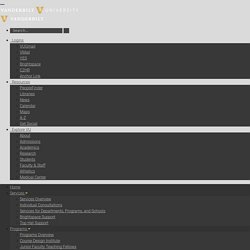
Many college instructors think of their undergraduate students as adults and treat them as such. In this teaching guide, the terms adult students and adult learners refer to undergraduates who fall outside of the typical 18-24 age range, or who have life experiences and responsibilities beyond those typically expected of a college student. Understanding some of the characteristics and challenges of adult learners at Vanderbilt can enable faculty to support these students in positive ways.
Who is an adult? Despite being thought of as adults by many of their instructors, undergraduate students themselves do not share the perception that they are adults. In the United States, adolescents tend to transition into adulthood through a series of milestones. Research on What Works for Adult Learners.